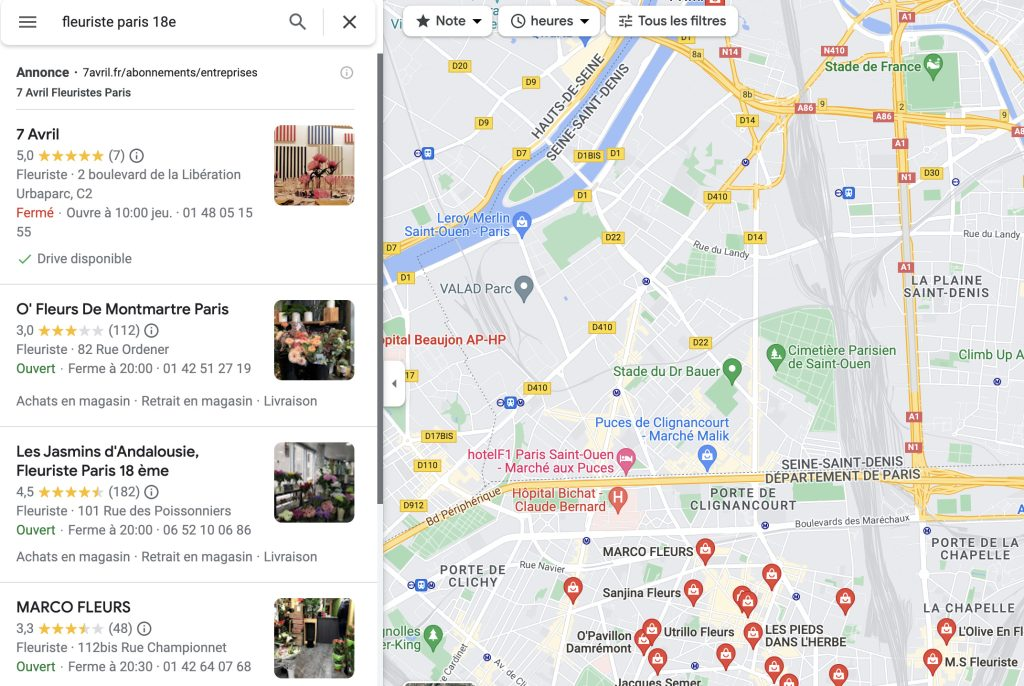How to Build Backlinks for Local SEO: Tips for Small Businesses
Introduction
A. Explanation of Backlinks and their importance for Local SEO
Backlinks are links that point to your website from other sites on the internet. They play an important role in search engine optimization (SEO) as they are one of the most important ranking factors used by search engines to determine the relevance and authority of a website. The more high-quality backlinks a website has, the more likely it is to rank higher in search engine results pages (SERPs).
Backlinks are particularly important for local SEO, which focuses on improving a business’s visibility in local search results. Local SEO is crucial for small businesses that rely on local customers, such as restaurants, retail stores, and service providers. When people search for businesses or services in their local area, search engines like Google use a variety of factors to determine which businesses to show in the search results. One of the key factors that Google uses to rank local businesses is the number and quality of their backlinks.
B. Overview of the Article
In this article, we will provide tips and strategies for small businesses to build backlinks for local SEO. We will begin by explaining the basics of local SEO and the importance of backlinks in this context. We will then dive into the different types of backlinks that are particularly effective for local SEO, including guest posting, local directories, industry-specific directories, social media, and influencer outreach.
Next, we will provide specific tips for building backlinks for local SEO, including identifying local keywords, using citations, leveraging local media, joining local groups and associations, hosting local events, creating engaging content, and monitoring backlinks. We will also highlight some common mistakes to avoid when building backlinks, such as buying links or engaging in link exchange schemes.
Finally, we will provide a list of tools that small businesses can use to help build backlinks, such as Google My Business, Ahrefs, Majestic, and SEMrush. By following the strategies outlined in this article, small businesses can improve their local SEO and attract more local customers to their business.
Understanding Local SEO

A. Definition of Local SEO
Local SEO refers to the practice of optimizing a website and its content to improve its visibility in local search results. This involves using a variety of strategies and tactics to help search engines like Google understand the location of a business and its relevance to local search queries. Local SEO is particularly important for small businesses that rely on local customers to drive their business.
B. Benefits of Local SEO
The benefits of local SEO for small businesses are numerous. For one, local SEO helps small businesses reach a highly targeted audience of potential customers who are actively searching for their products or services. This can lead to increased website traffic, higher conversion rates, and ultimately, more revenue for the business.
In addition, local SEO can help small businesses stand out from their competitors in local search results. By optimizing their website and content for local search queries, small businesses can increase their visibility and attract more customers to their business.
Finally, local SEO can help small businesses build trust and credibility with their local audience. When a business appears at the top of local search results, it sends a signal to potential customers that the business is reputable, trustworthy, and authoritative in its industry.
C. Difference between Local SEO and Traditional SEO
While local SEO and traditional SEO share many similarities, there are some key differences between the two. Traditional SEO focuses on improving a website’s visibility in global search results, while local SEO focuses specifically on improving a website’s visibility in local search results.
Another key difference between the two is the importance of location-based keywords. In traditional SEO, keywords are often focused on global search terms that are relevant to a business’s industry or niche. In local SEO, keywords are often focused on location-based terms, such as the name of a city or neighborhood.
Finally, local SEO places a greater emphasis on local citations, which are mentions of a business’s name, address, and phone number (NAP) on other websites. Citations help search engines like Google verify the location and legitimacy of a business, which can improve its visibility in local search results.
Overall, understanding the basics of local SEO is crucial for small businesses looking to improve their visibility and attract more local customers. By optimizing their website and content for local search queries, small businesses can improve their local SEO and drive more traffic and revenue to their business.
Tips for Building Backlinks for Local SEO

A. Focus on Quality over Quantity
When it comes to building backlinks for local SEO, quality is more important than quantity. It’s better to have a few high-quality backlinks from authoritative websites than a large number of low-quality backlinks from spammy websites. Focus on building relationships with reputable websites in your industry and creating high-quality content that is worth linking to.
B. Use Local Keywords
Using local keywords in your content and backlinks can help improve your local SEO. This means including keywords that are specific to your local area, such as the name of your city or neighborhood. When building backlinks, make sure to use local keywords in the anchor text of the link.
C. Diversify Your Backlink Profile
It’s important to diversify your backlink profile by building links from a variety of sources. This means using a combination of guest posting, local directories, industry-specific directories, social media, and influencer outreach to build a strong backlink profile. This can help improve your local SEO and protect your website from being penalized by search engines.
D. Monitor Your Backlinks
It’s important to monitor your backlinks on a regular basis to ensure that they are high-quality and relevant to your business. Use tools like Google Search Console and Ahrefs to track your backlinks and identify any potential issues. If you notice any low-quality or spammy backlinks, take steps to remove them or disavow them using Google’s Disavow Tool.
E. Build Relationships with Local Websites
Building relationships with other local websites in your area can be a great way to build high-quality backlinks for local SEO. This can involve collaborating on content, offering to write guest posts, or simply engaging with other local businesses on social media. By building strong relationships with other local websites, you can create a network of high-quality backlinks that can help improve your local SEO.
In conclusion, building backlinks for local SEO requires a combination of strategy, creativity, and persistence. By focusing on quality over quantity, using local keywords, diversifying your backlink profile, monitoring your backlinks, and building relationships with local websites, small businesses can build a strong backlink profile that improves their local SEO and attracts more local customers.
Common Mistakes to Avoid
While building backlinks for local SEO can be a highly effective strategy for small businesses, it’s important to avoid common mistakes that can actually harm your SEO efforts. Here are some common mistakes to avoid:
A. Buying Backlinks
Buying backlinks is a practice that is frowned upon by search engines and can actually harm your website’s SEO. Instead of buying backlinks, focus on building relationships with reputable websites and creating high-quality content that is worth linking to.
B. Using Exact Match Anchor Text
Using exact match anchor text, or using the exact keyword phrase you want to rank for in the anchor text of a link, can actually be seen as spammy by search engines. Instead, use variations of your target keyword and mix in other related keywords to make your anchor text look more natural.
C. Using Low-Quality Directories
Submitting your website to low-quality directories can actually harm your SEO rather than help it. Focus on submitting your website to reputable directories that are relevant to your industry or location.
D. Neglecting Local SEO
While building backlinks can be a highly effective strategy for improving your local SEO, it’s important to also focus on other aspects of local SEO such as local citations, reviews, and on-page optimization. Neglecting these other aspects can limit the effectiveness of your backlink building efforts.
E. Not Monitoring Your Backlinks
As mentioned earlier, it’s important to monitor your backlinks to ensure that they are high-quality and relevant to your business. Neglecting to monitor your backlinks can lead to issues such as low-quality or spammy backlinks that can harm your SEO efforts.
By avoiding these common mistakes and following the tips outlined in this article, small businesses can build a strong backlink profile that improves their local SEO and attracts more local customers. It’s important to remember that building backlinks for local SEO is a long-term strategy that requires persistence and effort, but the results can be well worth it in the end.
Conclusion
Building backlinks for local SEO can be a highly effective strategy for small businesses looking to attract more local customers. By building a strong backlink profile, small businesses can improve their visibility in local search results, increase their website traffic, and ultimately grow their business.
To build a strong backlink profile, small businesses should focus on quality over quantity, use local keywords, diversify their backlink profile, monitor their backlinks, and build relationships with other local websites. By avoiding common mistakes such as buying backlinks, using exact match anchor text, and neglecting local SEO, small businesses can ensure that their backlink building efforts are effective and sustainable.
While building backlinks for local SEO requires effort and persistence, the results can be well worth it in the end. By following the tips outlined in this article, small businesses can build a strong backlink profile that improves their local SEO and helps them attract more local customers.
Overall, building backlinks for local SEO is just one part of a comprehensive digital marketing strategy for small businesses. It’s important to also focus on other aspects of digital marketing such as local citations, reviews, on-page optimization, and social media marketing to maximize your online visibility and attract more local customers.
In conclusion, small businesses that invest in building a strong backlink profile for local SEO can gain a competitive advantage in their local market and attract more customers to their business. By following the tips outlined in this article and avoiding common mistakes, small businesses can improve their online visibility and grow their business for years to come.










Write a Comment